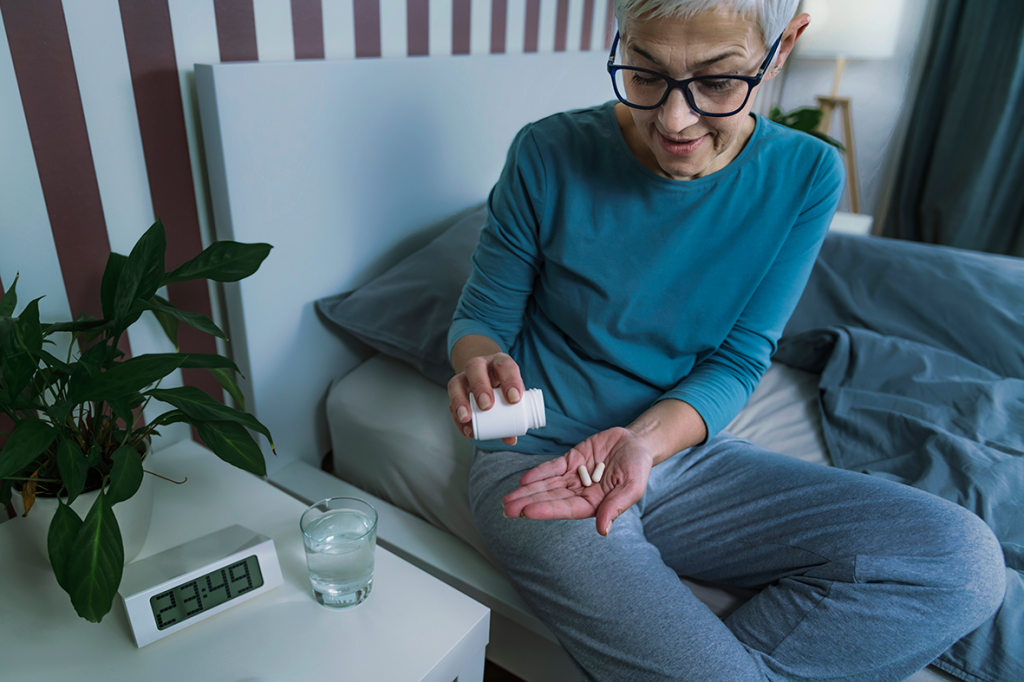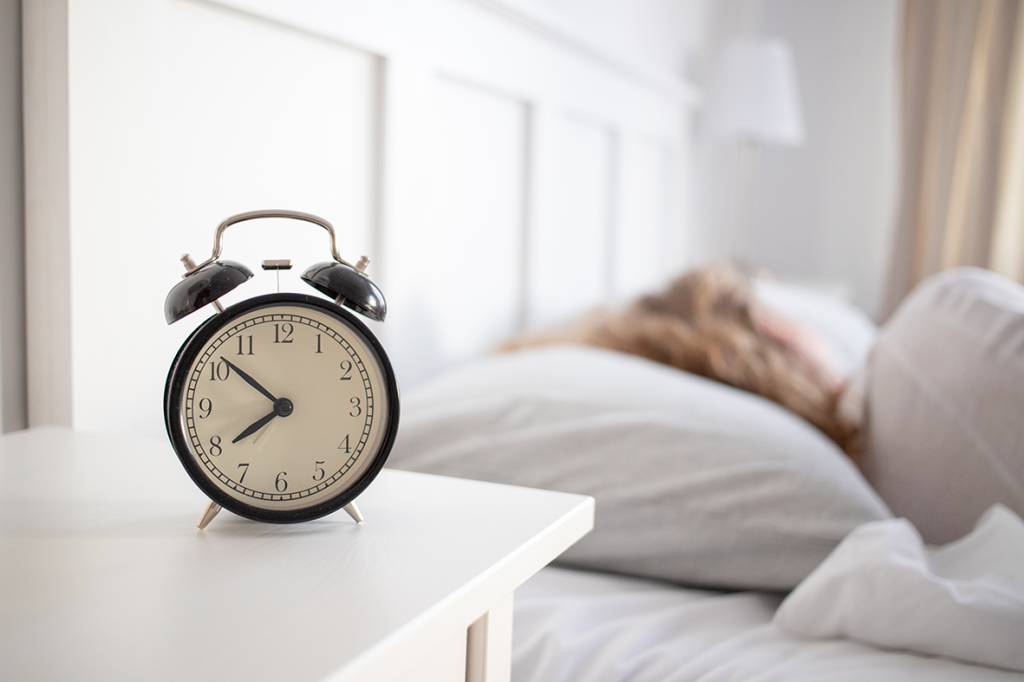Understanding Melatonin: Benefits, Side Effects, and How It Affects Sleep
27 December 2023


Do you struggle to fall asleep at night? Have you ever wondered why some people seem to effortlessly drift off into dreamland while you toss and turn? The answer may lie in a hormone called melatonin. In this comprehensive guide, we will delve into the world of melatonin, its benefits, potential side effects, and how it affects your sleep.



What is Melatonin?
Melatonin is a naturally occurring hormone produced by the pineal gland in your brain. Often referred to as the ‘sleep hormone’, it plays a crucial role in regulating your sleep-wake cycle. The release of melatonin is influenced by light and darkness, with levels rising in the evening and remaining elevated throughout the night, promoting sleep.
Melatonin helps synchronise your body’s internal clock, known as the circadian rhythm, with the 24-hour light-dark cycle. This biological process helps regulate various bodily functions, including sleep, mood, and immune system activity.
How Does Melatonin Work?
To understand how melatonin works, let’s take a closer look at its role in your sleep-wake cycle. When darkness falls, your brain senses the absence of light and signals the pineal gland to release melatonin into your bloodstream. This surge in melatonin levels signals to your body that it’s time to wind down and prepare for sleep.
As melatonin levels rise, you may begin to feel drowsy, which is an indication that sleep is approaching. It’s important to create a sleep-friendly environment by dimming the lights, reducing exposure to electronic devices, and establishing a relaxing bedtime routine to enhance the effects of melatonin.
Melatonin for Sleep: Benefits and Effects
Melatonin is widely recognised for its role in improving sleep quality and combating insomnia. By taking melatonin as a supplement, you can help regulate your sleep-wake cycle and promote better sleep. Let’s explore the benefits of melatonin for sleep:
- Faster sleep onset: melatonin can reduce the time it takes to fall asleep, allowing you to drift off more quickly.
- Enhanced sleep duration: melatonin has been shown to increase the total duration of sleep, ensuring a more restful night.
- Improved sleep quality: by regulating your sleep-wake cycle, melatonin promotes deeper, more rejuvenating sleep, leading to increased alertness and vitality during the day.
- Shift work and jet lag: melatonin can be particularly beneficial for individuals who experience disruptions to their sleep schedule due to shift work or travel across time zones.
While melatonin is generally safe for short-term use, it’s essential to consult with a healthcare professional to determine the appropriate dosage and address any potential interactions or contraindications with other medications.
Melatonin Side Effects
Although melatonin is considered safe for most people, it can cause side effects in some individuals. It’s crucial to be aware of these potential side effects:
- Daytime sleepiness: taking melatonin during the day or in excessive doses may lead to drowsiness and grogginess.
- Headaches and dizziness: some individuals may experience headaches or dizziness after taking melatonin supplements.
- Stomach discomfort: in rare cases, melatonin can cause gastrointestinal issues such as nausea, diarrhoea, or stomach cramps.
Everyone reacts differently to substances, and the side effects of melatonin can vary from person to person. It’s important to start with a low dosage and gradually increase it if needed, while closely monitoring your body’s response.
If you experience any concerning or persistent side effects, it’s advisable to discontinue melatonin use and consult with a healthcare professional. They can provide personalised guidance based on your specific needs and medical history.
Melatonin: A Natural Sleep Aid
Melatonin is a natural alternative to traditional sleep medications, making it an attractive option for those seeking a more holistic approach to sleep support. Unlike prescription sleep aids, melatonin is available over-the-counter in many countries and can be easily purchased from pharmacies or health food stores.
One of the advantages of melatonin is its gentle and non-addictive nature. It doesn’t induce the same level of dependence or withdrawal symptoms often associated with other sleep medications. However, it’s crucial to use melatonin responsibly and follow recommended dosages to avoid potential risks.
What Does Melatonin Do Besides Promoting Sleep?
While melatonin is primarily known for its sleep-enhancing properties, it has other potential benefits as well. Research suggests that melatonin may play a role in:
- Jet lag: melatonin can help alleviate the symptoms of jet lag by adjusting your body’s internal clock to a new time zone.
- Shift work: individuals working night shifts or irregular schedules may benefit from melatonin supplementation to promote better sleep during the daytime.
- Sleep disorders: melatonin has shown promise in managing certain sleep disorders, such as delayed sleep phase syndrome and insomnia.
- Migraine prevention: some studies indicate that melatonin may help reduce the frequency and intensity of migraines, although further research is needed to confirm these findings.
- Antioxidant effects: melatonin is also known for its antioxidant properties, which can help protect your cells from damage caused by free radicals and oxidative stress.
How to Incorporate Melatonin into Your Sleep Routine
If you’re considering trying melatonin to improve your sleep, it’s essential to establish a consistent bedtime routine. Here are some tips to maximise the benefits of melatonin:
- Create a relaxing environment: make your bedroom a sleep-friendly sanctuary by reducing noise, controlling the temperature, and ensuring your mattress and pillows provide proper comfort and support.
- Limit screen time: exposure to electronic devices, especially before bedtime, can interfere with melatonin production. Aim to limit screen time and avoid bright screens at least an hour before sleep.
- Establish a bedtime routine: engage in relaxing activities such as reading a book, taking a warm bath, or practising deep breathing exercises to signal to your body that it’s time to wind down.
- Consider light exposure: expose yourself to natural daylight during the day and minimise exposure to bright lights in the evening, as this can disrupt melatonin production.
- Consult a healthcare professional: if you have any underlying health conditions or are taking medications, it’s important to consult with a healthcare professional before starting melatonin supplementation.
The Science Behind Melatonin
To truly understand melatonin, it’s important to delve into the science behind this remarkable hormone. As mentioned earlier, melatonin is produced by the pineal gland in the brain. But how exactly does it work to regulate our sleep? Let’s explore the intricate mechanisms at play.
The Role of Light and Darkness
Light plays a crucial role in melatonin regulation. When exposed to light, especially bright light, the production of melatonin is suppressed. This is why it’s important to minimise light exposure, particularly in the evening, to allow melatonin levels to rise and signal the body that it’s time to sleep.
The Circadian Rhythm
Our bodies are guided by an internal clock known as the circadian rhythm. This rhythm dictates our sleep patterns, hormone production, body temperature, and more. Melatonin is a key player in synchronising this rhythm with the external environment. By rising in the evening and remaining elevated throughout the night, melatonin helps align our sleep-wake cycle with the natural day-night cycle.
Individual Variations
It’s worth noting that individuals may have variations in melatonin production and sensitivity to its effects. Some people naturally produce more melatonin than others, which can affect their sleep patterns. Additionally, factors such as age, lifestyle, and underlying health conditions can influence melatonin levels and how our bodies respond to it.
Melatonin and Sleep Disorders
While melatonin is primarily known for its sleep-promoting properties, it has also shown promise in managing certain sleep disorders. Let’s explore how melatonin can be beneficial in specific sleep-related conditions.
Insomnia
Insomnia is a common sleep disorder characterised by difficulty falling asleep or staying asleep. Melatonin can help regulate the sleep-wake cycle, making it a potential tool in managing insomnia. By taking melatonin supplements before bedtime, individuals with insomnia may experience improved sleep quality and reduced sleep onset time.
Delayed Sleep Phase Syndrome
Delayed Sleep Phase Syndrome (DSPS) is a condition in which an individual’s sleep-wake cycle is significantly delayed compared to the typical 24-hour cycle. This can result in difficulty falling asleep at a desired bedtime and struggling to wake up in the morning. Melatonin can be used to shift the sleep-wake cycle earlier, helping individuals with DSPS establish a more regular sleep pattern.
Shift Work Sleep Disorder
Shift work disrupts the natural sleep-wake cycle, as individuals are required to work during hours that are typically reserved for sleep. This can lead to difficulties falling asleep during the day and feeling excessively sleepy during work hours. Melatonin supplements can assist shift workers in adjusting their sleep patterns to align with their work schedule, promoting better sleep quality and daytime alertness.
Melatonin Safety and Precautions
As with any supplement or medication, it’s important to be aware of safety considerations and precautions when using melatonin. While melatonin is generally considered safe for short-term use, it’s essential to exercise caution and follow recommended guidelines.
Recommended Dosage
The appropriate dosage of melatonin varies depending on the individual and the specific sleep issue being addressed. It’s advisable to start with a low dosage and gradually increase if needed. Consulting with a healthcare professional can provide personalised guidance on the optimal dosage for your situation.
Potential Interactions and Side Effects
Melatonin may interact with certain medications or health conditions. It’s important to inform your healthcare provider about any medications you are currently taking or any underlying health conditions before starting melatonin supplementation. They can help determine if melatonin is suitable for you and advise on potential interactions or contraindications.
Additionally, while melatonin is generally well-tolerated, some individuals may experience side effects such as daytime sleepiness, headaches and dizziness. These side effects are usually mild and temporary, but if they persist or become bothersome, it’s recommended to consult with a healthcare professional.
Long-Term Use and Dependency
Melatonin is typically safe for short-term use, but its long-term effects are still being studied. It’s generally not recommended to rely on melatonin as a long-term solution for sleep issues without medical supervision. The goal should be to address the underlying causes of sleep problems and develop healthy sleep habits.
Moreover, it’s important to note that melatonin is not intended to replace good sleep hygiene practices. Establishing a consistent sleep schedule, creating a sleep-friendly environment, and practising relaxation techniques are essential for optimising sleep quality and quantity.
Embrace the Wonders of Melatonin
Melatonin, the ‘sleep hormone’, plays a crucial role in regulating our sleep-wake cycle. By understanding its science, benefits, potential side effects, and applications in sleep disorders, we can make informed decisions about incorporating melatonin into our sleep routine.
While melatonin can be a valuable aid in improving sleep quality and managing specific sleep issues, it’s essential to use it responsibly and in consultation with a healthcare professional. They can provide personalised advice based on your unique needs and help monitor for any potential interactions or adverse effects.
Melatonin is just one piece of the puzzle when it comes to achieving restful sleep. Maintaining a consistent sleep schedule, practising good sleep hygiene, and addressing any underlying sleep disorders or lifestyle factors are equally important for a healthy sleep routine.
So, embrace the wonders of melatonin, but do so with knowledge, caution, and a holistic approach to sleep. May your nights be filled with peaceful slumber and your days with renewed vitality. Sleep well!
FAQ
Can I become dependent on melatonin for sleep?
Melatonin is not known to cause dependence or withdrawal symptoms like some other sleep medications. However, it’s advisable to use melatonin responsibly and not rely on it as a long-term solution without addressing the underlying causes of sleep issues. Consult with a healthcare professional for guidance on your specific situation.
Are there any potential side effects of melatonin?
While melatonin is generally well-tolerated, some individuals may experience mild side effects such as daytime sleepiness, headaches, or dizziness. These side effects are usually temporary and resolve on their own. If you have any concerns or persistent side effects, it’s best to consult with a healthcare professional.
Can melatonin be used by everyone, including children and older adults?
Melatonin is generally considered safe for short-term use in adults. However, it’s important to consult with a healthcare professional before giving melatonin to children or older adults. They can provide appropriate guidance based on individual needs, as children and older adults may require different dosages or have specific considerations.
You may like these too
“The Hidden Dangers of Varicose Veins: When Ornate Legs Are in Danger”
Discover the unexpected causes, symptoms, and latest varicose vein treatments that can affect your h
24 January 2025
“The Inaudible Burden: How Tinnitus Can Change Your Life”
“Discover the hidden battle against the constant buzz in your ears and learn how to rega
24 January 2025
“Migraine: More than just headaches”
“Discover the hidden causes, effective treatments and tips to overcome the daily battle agains
24 January 2025
How to Lower My High Cholesterol:Tips and Advice for a Healthier Heart
Cholesterol is a common health problem that can lead to serious complications such as cardiovascular
17 April 2024



